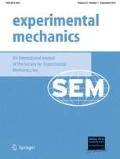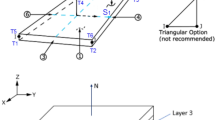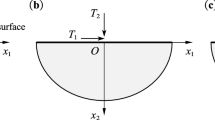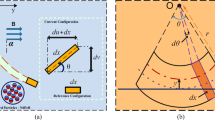Abstract
The classical thermoelastic equation and the generalized heat conduction equation are developed to deal with a non-adiabatic response in thermoelastic stress analysis. A FE simulation procedure is set up to solve the heat conduction equation over a range of loading frequencies. A small disc (20 mm diameter) loaded under three-point diametric compression is used to examine the effect of in-plane heat conduction. As the disc has regions of zero, moderate and high stress gradients it is an ideal component for this analysis. A regime is developed that provides a basis for an assessment of the nature of the response and allows a minimum loading frequency to be identified so that adiabatic behaviour is obtained. This validity of this approach is demonstrated on steel disc of 20 mm diameter. A special loading device has been designed to obtain the three-point loading and a recently introduced Instron Electropuls test machine is used to achieve the high levels of cyclic loading required for the adiabatic conditions.













Similar content being viewed by others
References
Stanley P, Chan WK (1985) Quantitative stress analysis by means of the thermoelastic effect. J Strain Analysis for Eng Des 20:129–137. doi:10.1243/03093247V203129
Dunn SA (1993) On the effects of through-thickness thermal conduction on stress measurement by thermoelastic techniques. Exp Mech 33:32–36. doi:10.1007/BF02322547
Sathon N, Dulieu-Barton JM (2007) Evaluation of sub-surface stresses using thermoelastic stress analysis. Appl Mech Mater 7–8:153–158. doi:10.4028/www.scientific.net/AMM.7-8.153
Inoue H, Kishimoto K (2004) The effect of heat conduction in thermoelastic stress analysis. In Proceedings of the 12th International Conference on Experimental Mechanics, 742–743, Italy
Biot MA (1956) Thermoelasticity and irreversible thermodynamics. J Appl Physi 27:240–253. doi:10.1063/1.1722351
Phan TS, Dulieu-Barton JM, Temarel P (2006) Thermoelastic stress analysis of structures under natural vibrations. Exp Mech 46:463–472. doi:10.1007/s11340-006-8445-6
Sathon N (2006) Damage and stress analysis on pipework using thermoelastic stress analysis, Thesis for the degree of Doctor of Philosophy, University of Southampton
Dulieu-Smith JM (1993) Applications and development of the thermoelastic stress technique, Thesis for the degree of Doctor of Philosophy, University of Manchester
Lesniak JR, Boyce BR, Sandor BI (1991) Thermoelastic stress analysis/NDE via focal plane array detectors, NASA Final Report, WISP-0915-JLI
Dulieu-Smith JM (1995) Alternative calibration techniques for quantitative thermoelastic stress analysis. Strain 31:9–16. doi:10.1111/j.1475-1305.1995.tb00949.x
Den Hartog JP (1952) Advanced strength of materials. McGraw-Hill, New York
Acknowledgements
The financial support from China Scholarship Council and UK DEfS are gratefully acknowledged. The Deltatherm system used in this work was provided by the UK Engineering and Physical Sciences Research Council Loan Pool.
Author information
Authors and Affiliations
Corresponding author
Rights and permissions
About this article
Cite this article
Wang, W.J., Dulieu-Barton, J.M. & Li, Q. Assessment of Non-Adiabatic Behaviour in Thermoelastic Stress Analysis of Small Scale Components. Exp Mech 50, 449–461 (2010). https://doi.org/10.1007/s11340-009-9249-2
Received:
Accepted:
Published:
Issue Date:
DOI: https://doi.org/10.1007/s11340-009-9249-2




